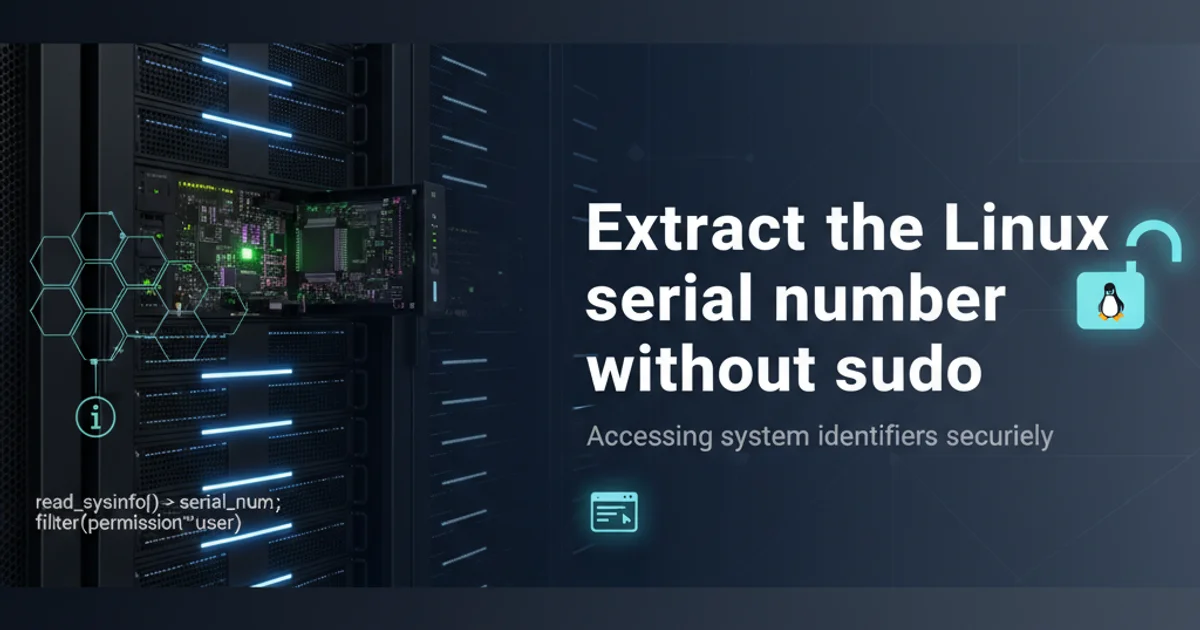Extract the Linux serial number without sudo
Categories:
Extracting Linux Serial Numbers Without Sudo Privileges

Learn various methods to retrieve your Linux system's serial number without requiring root access, focusing on common hardware and virtual environments.
Identifying the serial number of a Linux system is often crucial for inventory management, warranty claims, or troubleshooting. While sudo access provides the most straightforward path, it's not always available. This article explores several techniques to extract the serial number from different hardware components and virtual machines, all without requiring elevated privileges.
Understanding Serial Number Sources
The 'serial number' of a Linux system isn't a single, unified identifier. Instead, it typically refers to the serial number of a specific hardware component, most commonly the motherboard (baseboard) or the chassis (system enclosure). In virtualized environments, this information is often passed through by the hypervisor, or it might be a generated UUID. The availability and accuracy of these methods depend heavily on the system's hardware, firmware, and whether it's a physical or virtual machine.
flowchart TD
A[Start: Need Serial Number] --> B{Physical or Virtual?}
B -->|Physical| C[Check DMI/SMBIOS]
C --> D{`dmidecode` available?}
D -->|Yes| E[Try `dmidecode` with specific types]
D -->|No| F[Check `/sys/class/dmi/id/`]
F --> G{Files exist?}
G -->|Yes| H[Read `board_serial`, `product_serial`, etc.]
G -->|No| I[Consider `lshw` (if installed)]
B -->|Virtual| J[Check `virt-what` or `systemd-detect-virt`]
J --> K{VM detected?}
K -->|Yes| L[Look for hypervisor-specific files/commands]
K -->|No| C
E --> M[Output Serial Number]
H --> M
I --> M
L --> M
M[End]Decision flow for locating a Linux serial number without sudo.
Method 1: Leveraging /sys/class/dmi/id/ (Most Common)
Modern Linux kernels expose a wealth of hardware information through the /sys filesystem, specifically via the DMI (Desktop Management Interface) or SMBIOS (System Management BIOS) interface. This is often the most reliable method for physical machines when dmidecode requires sudo. You can directly read files within /sys/class/dmi/id/ to find various serial numbers.
cat /sys/class/dmi/id/board_serial
cat /sys/class/dmi/id/product_serial
cat /sys/class/dmi/id/chassis_serial
cat /sys/class/dmi/id/bios_serial
Checking various serial number files in /sys/class/dmi/id/.
board_serial file typically contains the motherboard's serial number, which is often what people refer to as the 'system serial number'. product_serial might be the same or refer to the overall system's serial number if it's a pre-built system.Method 2: Using dmidecode (If Permissions Allow)
The dmidecode utility reads DMI table information, which includes serial numbers. While it usually requires sudo to access /dev/mem, some distributions or configurations might allow non-root users to read specific DMI types if the necessary permissions are set, or if the system is configured to expose this information differently. It's worth trying without sudo first.
dmidecode -s system-serial-number
dmidecode -s baseboard-serial-number
dmidecode -s chassis-serial-number
Attempting to retrieve serial numbers using dmidecode without sudo.
dmidecode returns an error like Permission denied or Can't open /dev/mem, it means you do not have the necessary permissions to run it without sudo. In such cases, rely on the /sys/class/dmi/id/ method.Method 3: Virtual Machine Specifics
In virtualized environments, the serial number might be a UUID (Universally Unique Identifier) generated by the hypervisor. This is often exposed through /sys/class/dmi/id/product_uuid or similar paths. Tools like virt-what or systemd-detect-virt can help identify if you're in a VM, which might guide your search.
# Check if it's a VM
virt-what
systemd-detect-virt
# Retrieve UUID (often used as serial in VMs)
cat /sys/class/dmi/id/product_uuid
Identifying virtual machines and retrieving their UUIDs.
product_uuid is often the most relevant identifier, as a traditional hardware serial number doesn't exist in the same way it does for physical machines.